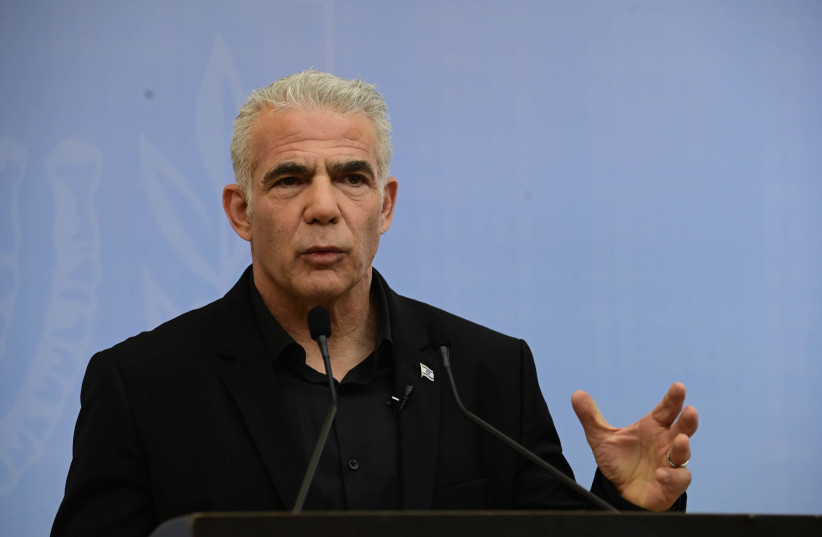Opposition leader Yair Lapid presented an eight-part plan on Thursday that he encouraged the government to follow to better care for civilians affected by Israel's war with Hamas.
The Yesh Atid leader criticized the government for a lack of action and failure to come to its senses.
"The shock and paralysis of the governmental systems was understandable in the first days [of the war]," he said. "But I don't understand why the system has still not come to its senses. The government is not present - not with evacuees, not with hostages, not with survivors, not with families of citizens who have been called up to reserves, and not with the children who don't have a routine."
Lapid added that his plan was designed to help restart the system and help it work more smoothly.
"The plan we're presenting here is not designed to strike at the government," he said. "We're here to help."

The first thing Lapid encouraged the government to do was have better communication with its citizens. Lapid said the government ought to appoint an official spokesperson for the public who updates them daily.
For evacuees, Lapid said a plan to assist them had to be presented to them immediately. The budget for this should be under the responsibility of the local authorities while housing solutions and more rehabilitation grants should be made available to them immediately.
Next, Lapid said the small and medium-sized businesses had to be supplied with economic assuraties, allowances, and flexible grants.
Fourth, Lapid suggested flexible economic allowances for families of reserve soldiers who were called up.
Lapid: more mental health care for all ages
Lapid's next suggestion pertained to the education system and it included the optimal education routine with emotional support for the children, and the Yesh Atid leader said there had to be an emphasis on supplying evacuated children with education routines.
A wider set of solutions for mental health was next and included enlisting more therapists and transferring the responsibility and budget for them to local authorities.
Strengthening Israelis' sense of personal safety was next with Lapid suggesting reorganizing local security, including emergency response teams, expanding Israel Police and more work that would be coordinated with the local authorities, the Home Front Command, and the National Security Ministry.
Finally, Lapid urged the government to shut down redundant ministries and transfer their budgets along with coalition funds to the needs of the war and supporting local authorities.
Lapid said the plan was formulated together with experts, local authorities, and people who managed various ministries both at wartime and in peace and added that it had been forwarded to the Prime Minister's Office, the Finance Ministry, and the Federation of Local Authorities in Israel.
